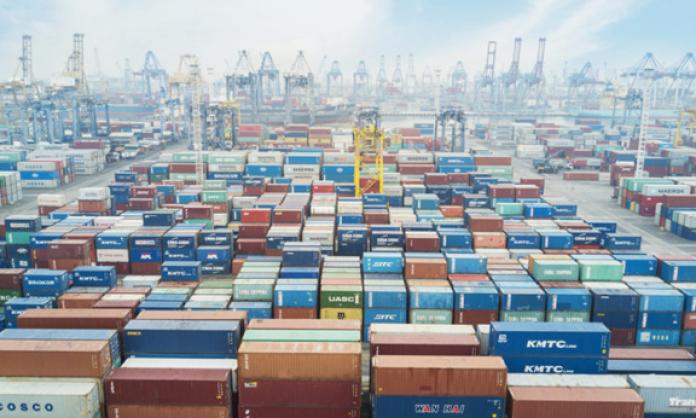The company at the heart of the dispute at Webb Dock, Melbourne, has an international reputation for union busting and abuse of workers.
International Container Terminal Services Inc. (ICTSI) has gained a toe-hold in the Port of Melbourne from where it wants to expand, firmly establish its practices on Australian wharfs and crush the Maritime Union.
Established in 1987, ICTSI operates 29 container terminals globally and has a well-established pattern of labour rights violations; workers’ grievances with ICTSI are many.
Wages at the company’s operations in many countries are inadequate for essential living costs – food, housing, clothing, transport, medical costs and schooling for the workers’ children. In Jakarta, the company’s workforce earns a base wage of just US$250 a month, 15 percent of the wages earned by dockworkers at a neighbouring terminal. With wages so low, workers are forced to work 50 or 60 hours overtime every week just to make ends meet, upping the risk of injuries at work. Even then, overtime is not paid at the proper rate.
ICTSI outsources workers in contravention of the laws of the countries in which it operates. The outsourced workers work alongside the permanents, sometimes in the same or similar roles, but unlike the permanents, they do not get holiday pay or sick pay. Many are denied sufficient safety equipment and are charged an access fee to enter the port to start the day’s work. ICTSI denies any responsibility for the wages and conditions of the outsourced workers.
At the port of Toamasina in Madagascar, privatised in the mid-2000s, ICTSI has outsourced much of its workforce to avoid legal responsibility for them and any connections with the local dockers’ union. The workers are paid piece rates; most can expect no more than US$9 a shift for what are often the most dangerous and dirty tasks, such as lashing containers. Many do not earn even this, and may not get paid if a ship is delayed or fails to arrive. But they must hang around the gates regardless, in case a ship comes in. Some even sleep at the terminal overnight, waiting for the next ship to arrive.
The Toamasina wharfies are fighting for permanency with proper contracts and entitlements. The labour hire company used by ICTSI denies them this despite a local court ruling in the workers’ favour in 2014.
In Jakarta, the union covering the outsourced workers took their case to the Manpower Office, arguing that their employment breached the country’s labour law, which limits the use of outsourced workers and how long they can be employed before being taken on by the company. The company called the workers in and told them to resign from the union or their contracts would not be extended. The Manpower Office ruled in favour of the workers but, months after its ruling in February 2017, they are still waiting to be taken on by ICTSI.
The company has a reputation for discriminating against trade union members. At its Madagascan port, the labour hire company it uses, state-owned SMMC, fired 43 dockworkers for going on strike in 2012 in protest at the company’s refusal to negotiate a new agreement. SMMC refuses to recognise the union, rehire the workers and pay them compensation despite tribunals ordering it to do so.
Five years later, the sacked unionists are still fighting for justice. Meanwhile, they are reduced to selling vegetables or pulling rickshaws to eke out an existence, earning a dollar or two a day.
Meanwhile, the managers at the port grow ever more wealthy. One of the sacked workers told a Guardian reporter in November: “If there were true human rights, it would not be like this. We have families and we have rent to pay, and we want to send our children to school. But we are neglected as if we are nothing, as if we are not human beings at all”.
Union busting is also the name of the game at ICTSI operations in Makassar in Indonesia, where management has used threats and intimidation to prevent union members from negotiating a collective agreement.
At the ICTSI operation in Batumi, Georgia, on the Black Sea, the company sacked union members who participated in a strike. In Papua New Guinea, the company’s first act on taking over the country’s two largest ports in 2017 was to sack the existing workforce of 1,000, replacing them with non-union labour.
In Honduras, the company won the contract to operate the port at Puerto Cortes in 2013. When the local union tried to open negotiations for a new collective agreement to cover the dockers, it faced an immediate onslaught by the company. Union members were sacked. Its activists were physically assaulted and subjected to military repression and death threats. The leader of the union was forced to flee the country.
When three Honduran union leaders spoke to fellow wharfies in the United States in 2014 to publicise their plight, the company alerted the Honduran national police who started a manhunt for them on their return. International Longshore and Warehouse Union (ILWU) president Robert McEllrath told the press: “This is what we have come to expect from ICTSI – the company is a serial labour rights abuser doing what it wants when it wants regardless of the workers and communities it plunders”.
Little wonder that company boss, billionaire Enrique Razon Jr, told a business conference in November: “The countries with the best infrastructure in the world are dictatorships”.
It’s not just in low-wage countries with few labour rights where the company tries to screw the workers. In 2010, ICTSI took over the container handling terminal at the port of Portland, Oregon, in the US. Its anti-worker practices became obvious and in 2014 it was fined by the Occupational Safety and Health Administration for breaches of more than a dozen safety codes, including not informing workers about exposure to airborne lead.
More threatening, however, was ICTSI’s attempt to break from the industry agreement covering west coast ports. The agreement between the ILWU and the port employers’ federation has for many decades ensured good conditions for wharfies across the west coast and automatic recognition for the ILWU. By going it alone, the company wanted to smash the ILWU as the first step to driving down wages and conditions.
The union took industrial action to safeguard the agreement in 2012. In response, the company took it to court seeking millions of dollars in damages. There followed a five-year legal and industrial battle. ICTSI eventually folded and walked away in February 2017, but threatened to pursue its legal claim against the union.
In its drive for profits and expansion, the company routinely neglects safety standards. The International Transport Workers Federation has listed a string of problems at ICTSI terminals: poor maintenance of equipment; working at heights without fall protection or harnesses; failure to properly manage access into and within the terminal, putting workers at risk of collision with vehicles and heavy machinery; failure to provide safety equipment such as boots and helmets; and requiring workers to work under suspended loads.











